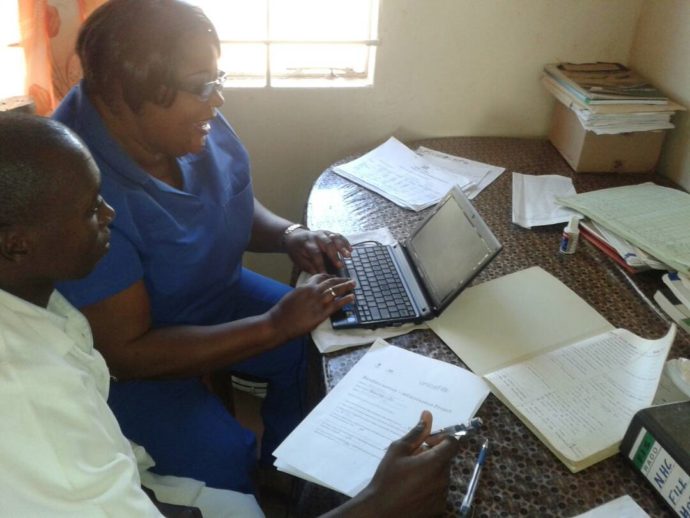Closing the immunization gap with care, empathy and compassion
By Mali Kambandu, Communications Officer, BID Initiative Zambia
Apr 26, 2017
Posted in People, Policies & Practices

Photo: PATH/Mali Kambandu. Mrs. Walumba works closely with other health workers in facilities across Zambia’s Southern Province to make sure they understand the importance of vaccination.
This African Vaccination Week, we’re celebrating immunization heroes who demonstrate an unwavering commitment to vaccinating the last mile.
Prosperinne Walumba has seen many things in her 30 years as a nurse. But despite all the transformations over the years, her personal code remains constant: her commitment to care, empathy, and compassion, something the BID Initiative is helping her spread by easing workloads and enabling health workers to deliver more personalized care.
“Just as much as I want to feel cared for, supported, understood, and helped, so does the patient,” she explains. “Nursing requires me to make a difference in a patient’s life and to do so with care, empathy, and compassion.”
After completing secondary school at 16, Mrs. Walumba began her nursing career with training in Zambia. Two months later, she was nominated to continue her studies in Germany. She later returned, working in Livingstone, Kabwe, Mpika and Chikankata while practicing general care, surgery and midwifery. Eventually, in 2014, Mrs. Walumba was promoted to Principal Nursing Officer for Southern Province, where she is responsible for coordinating maternal, neonatal, child and adolescent health throughout the province.
“Nursing was the career to help me bring hope to the hopeless, put a smile on sad faces and, above all, work in a team to save lives.”
Mrs. Walumba recognizes that immunization is a critical gateway for other health interventions.
“Taking their baby for vaccinations is a day that the women put aside to visit the local clinic,” explains Mrs. Walumba. “With their babies warmly bundled up in their best attire and a children’s clinic card in their hands, they find their way to any vaccination post or local clinic. Most mothers understand the need for vaccinations and the important role they have in protecting lives.”
However, she also acknowledges the challenges many mothers face – poor access to immunization services, a shortage of staff who can administer vaccines or supply shortfalls leaving some children unprotected, and long queues and great distances to reach their health facilities. These factors sometimes discourage mothers from making future visits.
An observer of an average health facility in Livingstone, Southern Province where BID Initiative began implementing its interventions, will note how many mothers come for growth monitoring and vaccinations. In a single month, Linda Clinic for example, sees 420 children under five. Because of this, mothers are not often given an opportunity to get counsel on the care their babies receive, or to discuss the mothers’ fears or thoughts. Without this meaningful interaction, they leave disappointed. Fixed vaccination days also increases the likelihood of children who do not show up for a scheduled vaccine or follow-up dose.
“On the child’s health card, sometimes [health workers] document things that unfortunately the mothers don’t understand,” explains Mrs. Walumba. “It is not in the African woman’s nature to question. This makes me realize that quality care for our communities is really still a big challenge and it takes a lot of workable strategies and efforts to change this picture.”
Fortunately, BID is helping immunization heroes like Mrs. Walumba to shift that patient-provider dynamic.
“In my position as a leader in MNCH service provision, I can share the status of immunization in the province, express my views and counsel on the importance of providing quality child health care services. I know BID Initiative’s aim is to improve the quality of data through data use interventions and the electronic immunization registry system,” she says. “This really excites me especially because the health facility will be able identify and follow up with children who do not show up for scheduled vaccines.”
By decreasing the time it takes to complete administrative tasks, health workers can dedicate more time to direct patient care.
“I also look forward to the nurses being able to provide more personalized care,” says Mrs. Walumba. “I believe every child has a right to be fully protected from preventable childhood illnesses.”
